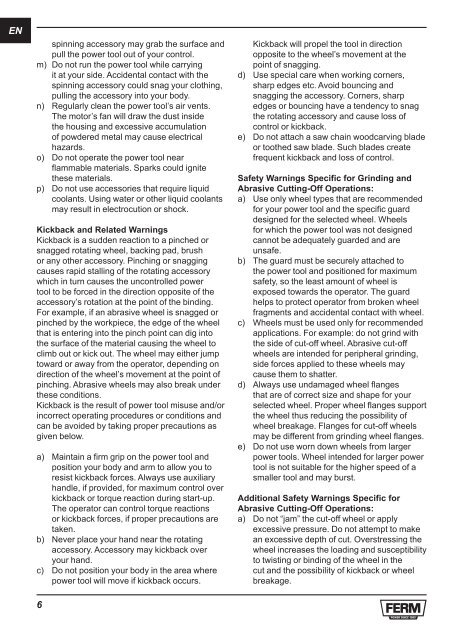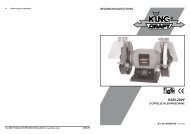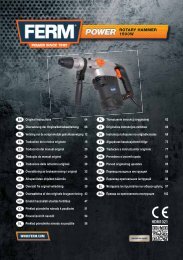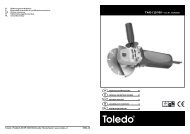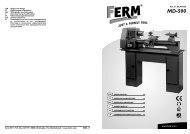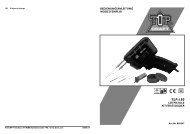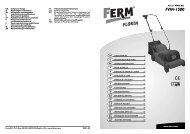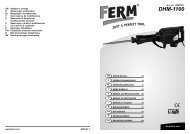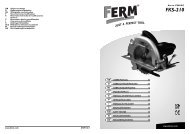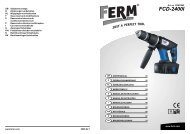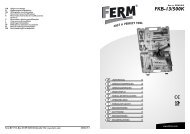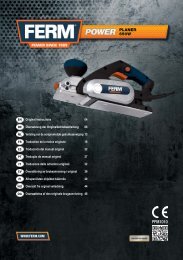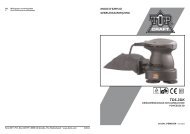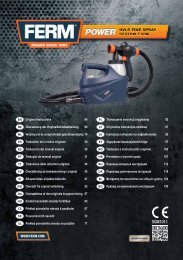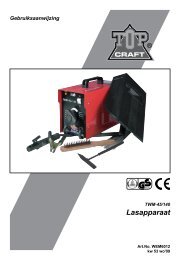AGM1037 - Firma Servotool GmbH
AGM1037 - Firma Servotool GmbH
AGM1037 - Firma Servotool GmbH
You also want an ePaper? Increase the reach of your titles
YUMPU automatically turns print PDFs into web optimized ePapers that Google loves.
EN<br />
spinning accessory may grab the surface and<br />
pull the power tool out of your control.<br />
m) Do not run the power tool while carrying<br />
it at your side. Accidental contact with the<br />
spinning accessory could snag your clothing,<br />
pulling the accessory into your body.<br />
n) Regularly clean the power tool’s air vents.<br />
The motor’s fan will draw the dust inside<br />
the housing and excessive accumulation<br />
of powdered metal may cause electrical<br />
hazards.<br />
o) Do not operate the power tool near<br />
flammable materials. Sparks could ignite<br />
these materials.<br />
p) Do not use accessories that require liquid<br />
coolants. Using water or other liquid coolants<br />
may result in electrocution or shock.<br />
Kickback and Related Warnings<br />
Kickback is a sudden reaction to a pinched or<br />
snagged rotating wheel, backing pad, brush<br />
or any other accessory. Pinching or snagging<br />
causes rapid stalling of the rotating accessory<br />
which in turn causes the uncontrolled power<br />
tool to be forced in the direction opposite of the<br />
accessory’s rotation at the point of the binding.<br />
For example, if an abrasive wheel is snagged or<br />
pinched by the workpiece, the edge of the wheel<br />
that is entering into the pinch point can dig into<br />
the surface of the material causing the wheel to<br />
climb out or kick out. The wheel may either jump<br />
toward or away from the operator, depending on<br />
direction of the wheel’s movement at the point of<br />
pinching. Abrasive wheels may also break under<br />
these conditions.<br />
Kickback is the result of power tool misuse and/or<br />
incorrect operating procedures or conditions and<br />
can be avoided by taking proper precautions as<br />
given below.<br />
a) Maintain a firm grip on the power tool and<br />
position your body and arm to allow you to<br />
resist kickback forces. Always use auxiliary<br />
handle, if provided, for maximum control over<br />
kickback or torque reaction during start-up.<br />
The operator can control torque reactions<br />
or kickback forces, if proper precautions are<br />
taken.<br />
b) Never place your hand near the rotating<br />
acces sory. Accessory may kickback over<br />
your hand.<br />
c) Do not position your body in the area where<br />
power tool will move if kickback occurs.<br />
6<br />
Kickback will propel the tool in direction<br />
opposite to the wheel’s movement at the<br />
point of snagging.<br />
d) Use special care when working corners,<br />
sharp edges etc. Avoid bouncing and<br />
snagging the accessory. Corners, sharp<br />
edges or bouncing have a tendency to snag<br />
the rotating accessory and cause loss of<br />
control or kickback.<br />
e) Do not attach a saw chain woodcarving blade<br />
or toothed saw blade. Such blades create<br />
frequent kickback and loss of control.<br />
Safety Warnings Specific for Grinding and<br />
Abrasive Cutting-Off Operations:<br />
a) Use only wheel types that are recommended<br />
for your power tool and the specific guard<br />
designed for the selected wheel. Wheels<br />
for which the power tool was not designed<br />
cannot be adequately guarded and are<br />
unsafe.<br />
b) The guard must be securely attached to<br />
the power tool and positioned for maximum<br />
safety, so the least amount of wheel is<br />
exposed towards the operator. The guard<br />
helps to protect operator from broken wheel<br />
fragments and accidental contact with wheel.<br />
c) Wheels must be used only for recommended<br />
applications. For example: do not grind with<br />
the side of cut-off wheel. Abrasive cut-off<br />
wheels are intended for peripheral grinding,<br />
side forces applied to these wheels may<br />
cause them to shatter.<br />
d) Always use undamaged wheel flanges<br />
that are of correct size and shape for your<br />
selected wheel. Proper wheel flanges support<br />
the wheel thus reducing the possibility of<br />
wheel breakage. Flanges for cut-off wheels<br />
may be different from grinding wheel flanges.<br />
e) Do not use worn down wheels from larger<br />
power tools. Wheel intended for larger power<br />
tool is not suitable for the higher speed of a<br />
smaller tool and may burst.<br />
Additional Safety Warnings Specific for<br />
Abrasive Cutting-Off Operations:<br />
a) Do not “jam” the cut-off wheel or apply<br />
excessive pressure. Do not attempt to make<br />
an excessive depth of cut. Overstressing the<br />
wheel increases the loading and susceptibility<br />
to twisting or binding of the wheel in the<br />
cut and the possibility of kickback or wheel<br />
breakage.


